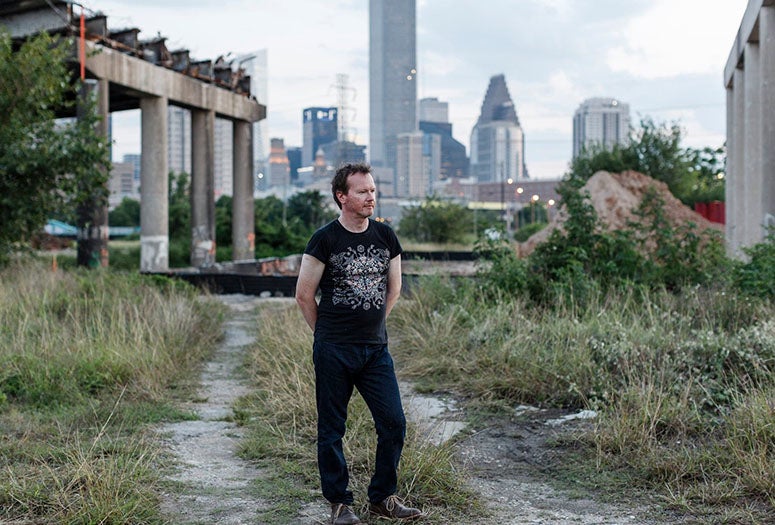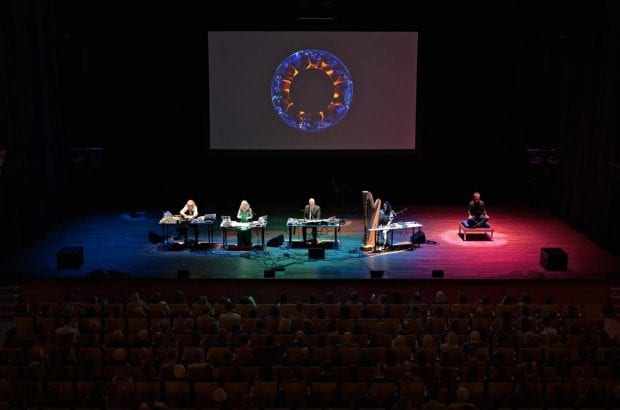We can’t think our way out of a climate crisis without first learning to feel our way out.
That’s the premise of a new show on BBC’s Radio 4 from Timothy Morton, Rice’s Rita Shea Guffey Professor of English. “The End of the World Has Already Happened” premiered Jan. 2 and aired in three parts, all of which are now available online.
Broadcast in the United Kingdom but largely set in Houston, Morton’s show is a contemplation of the complex emotional reasons why it’s difficult for many people to face climate change head-on — and how to cope with the anxiety and despair caused by contemplating the magnitude of, say, the estimated half-billion animals killed in the still-burning Australian bushfires, or the sheer impossibility of planting “one trillion trees” to offset carbon emissions.
“We’re traumatizing ourselves all the time with the shock,” Morton said of the traditional ways in which we discuss climate change, particularly in the media. “If there's one thing I really want to communicate to people with this show it’s that you're not guilty — but that we can all be responsible, and there’s a difference.”
“The End of the World Has Already Happened” is not a show centered in science, which is exactly as Morton intended. A self-described black sheep in a family of scientists, he instead studied poetry at the University of Oxford and eventually emerged as a leading philosopher in ecological theory and ontology, the branch of metaphysics that questions the very nature of being.
Along the way he coined terms for describing the thorny matters he explored in his books. There’s “dark ecology,” which he uses for discussing the “irony, ugliness and horror” inherent in nature. And there’s “hyperobject,” which describes something so large it can’t be pointed to as one thing, massively distributed across space and time; a hyperobject is global warming, for example, or all the Styrofoam on Earth, ever.
Morton’s work struck nerves, resonating especially with other artists for whom climate change was emerging as the central concern of the 21st century in the same way 19th-century artists contended with impending modernity.
His collaborations with artists eventually included Björk, Laurie Anderson and Jennifer Walshe, with whom he wrote an opera that premiered last year in Amsterdam. And soon, Morton will be partnering with director Adam McKay on projects that will come out of McKay’s new production company, Hyperobject Industries.
Ideas like hyperobjects and dark ecology must be reckoned with, Morton argues, if humans are to understand that we are not apart from the world but of it and in it. Only then, perhaps, will humans be better equipped to care for their environment as a holistic part of themselves that is also shared with the entire world.
But the reckoning part can be tough. After years spent pursuing these ideas through his work, Morton himself fell into a deep depression, which he discusses in the opening of the show’s first episode: “We’re doomed!”
“I’m scared and I’m shocked and I’m pretty traumatized and I think that everybody is,” Morton said. “Really, it’s just various degrees of admitting to it.”
Throughout that episode, Morton talks with experts examining why so many people are reluctant to engage with the topic of climate change. Psychotherapist Caroline Hickman explains our psyches’ defense mechanisms against trauma; journalist Amy Westervelt shares the reasons traditional news media tends to alternate between “technocratic savior” and “doomsday” coverage; and Hilton Kelley, an environmental activist in Port Arthur, Texas, shows Morton what one person can — or, just as often, cannot — achieve against such a hyperobject as the oil and gas industry.
Toward the end of the episode, writer and activist George Monbiot draws a comparison between coming to terms with his prostate cancer diagnosis and coming to terms with the global climate crisis.
“I found it very helpful to think of it as a part of myself, rather than this sort of alien thing from the dark side which had come to get me,” Monbiot tells Morton. “It was something to reckon with as part of my being and personality, and in that way I was able to incorporate it in a way that didn’t cause despair at all. I saw it not as a battle I had to fight but as a challenge I had to absorb.”
It’s a distillation of Morton’s own philosophy: Despair and guilt aren’t helpful feelings. But reckoning with other emotions and learning how to channel them into something positive? This, Morton contends, is the true path forward. Themes of coping, hope and liberation buoy the next two episodes.
“You could get despairing, but dolphins can't type,” Morton said, challenging listeners to leave with a sense that although we’re not responsible for climate change on an individual basis, we have a collective responsibility to our planet and environment.
“Dolphins can't use a keyboard to switch off a gas pipeline, can they? It's on us.”


